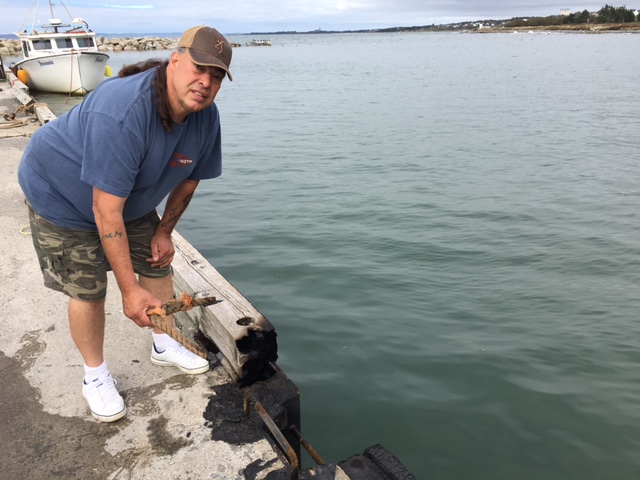Alex McDonald holds a strand of fishing rope in his hands.

“Look, you can’t twist it,” said the Mi’kmaq fisherman, explaining why he thinks arsonists needed a torch to detach his lobster boat from the wharf in Comeauville, N.S. on Monday.
READ MORE: N.S. RCMP investigating suspicious fires on fishing vessels
The 42-foot Cape Islander-style boat, named the Buck and Doe, ended up on fire in the middle of the Bay of St. Mary’s. The RCMP says it sank before it could be towed back to the wharf.
“It’s an awful feeling, you know. There’s no reason for it,” said McDonald, who says he recently spent $7,000 on the boat’s transmission.
McDonald does have an educated guess.

Commercial fishermen have complained Indigenous crews are breaking the rules, by selling large amounts of out-of-season summer lobster for profit, rather than just feeding their families.
READ MORE: N.S. lobster fishermen protesting outside DFO offices against illegal poaching
McDonald is the only Indigenous fisherman at the secluded wharf.
“It could be just agitators, because I fish along a lot of non-Native fishermen, and we don’t have any issues, we work together side-by-side,” he said.
This is the second suspected boat arson, in Southwest Nova Scotia, in a week. Another boat, the Amanda’s Pride 1, sustained extensive fire damage last Thursday.
McDonald says the non-Indigenous owner of that boat is not his enemy.
“Him and I talked earlier today, and he’s upset, just as much as I am,” he said.
Regardless of who’s responsible, fishermen Global News has spoken with on and off camera are afraid someone’s going to get injured or killed.
WATCH: N.S. lobster fishermen protesting outside DFO offices against illegal poaching

Similar tensions almost 20 years ago led to violence at New Brunswick’s Burnt Church reserve, including Department of Fisheries and Oceans officials ramming an indigenous boat. The Burnt Church dispute followed a Supreme Court ruling that Indigenous fishermen could harvest outside of the official lobster season, for limited amounts.
McDonald says he fished small amounts of lobster this summer with his family.
“We would go out for the weekend or something and then get what we got and take it home,” he said.
It’s also a sensitive issue for a federal government that has made Indigenous rights a priority. In a statement, Fisheries and Oceans Canada asks anyone with information on the boat fires to contact the RCMP.
READ MORE: 2nd man faces charges after threats made to Indigenous fishermen in Nova Scotia
“DFO will continue to work with all participants engaged in the Nova Scotia lobster fishery to ensure an orderly, safe, and sustainable environment for all boat owners and for all harvesters,” the statement reads.
Nova Scotia Premier Stephen McNeil is also weighing in, delicately.
“My hope is that everyone continues to recognize it’s been an ongoing process for a very long time. We all work together,” McNeil said.
McNeil is trying to remain positive, insisting there’s no proof the fires and the protest over summer fishing are connected.
READ MORE: Fishermen protest outside Fisheries office, lobsters dumped at ‘dozens’ of sites across Nova Scotia
“While we allow for the food and ceremonial fishery to take place, we also can allow an active fishery to go in communities across the province that would basically have both Native and non-Native fishermen working side-by-side,” McNeil said.
McDonald echoes the sentiments of many others, in hoping the violence doesn’t escalate.
“This needs to stop,” he said.
- Posters promoting ‘Steal From Loblaws Day’ are circulating. How did we get here?
- Canadian food banks are on the brink: ‘This is not a sustainable situation’
- Video shows Ontario police sharing Trudeau’s location with protester, investigation launched
- Solar eclipse eye damage: More than 160 cases reported in Ontario, Quebec




Comments